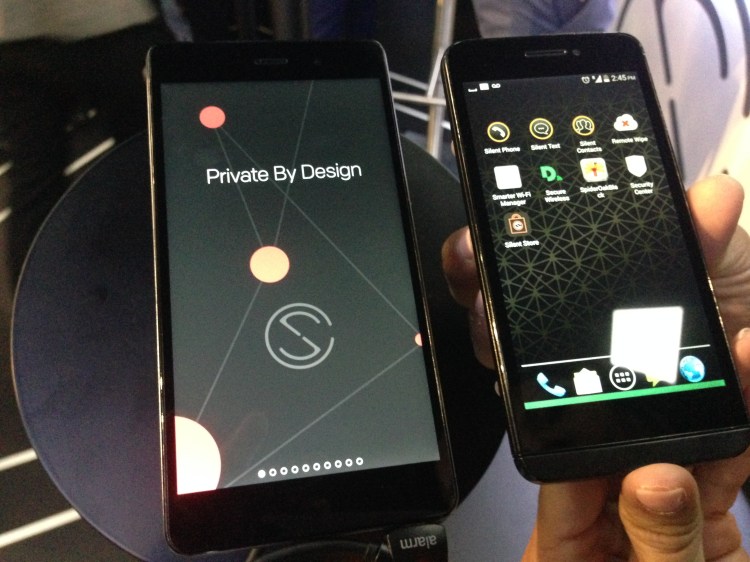People never hesitate to say that security and privacy are very, very important to them. But too often, their actions say otherwise.
Whether it’s never changing passwords, or not making them strong enough in the first place, people often fail to take the simplest of steps to enhance their privacy and security. And when shopping for a smartphone, how many questions do people ask the person at the Apple Store about things like monitoring and tracking and privacy? Not many.
But the folks at Silent Circle, based in Geneva, Switzerland, believe that’s changing, at long last, thanks to the avalanche of stories about government monitoring of digital communications and the non-stop news regarding major hacks that expose private information. They are betting that security and privacy have been elevated enough in the minds of businesses and consumers to make them a priority when it comes to making purchasing decisions.
To test that premise, the company will release in September the Blackphone 2, an Android-based smartphone that is optimized to protect security and privacy so that none of your data can be discovered or used by a third-party.
With a vastly improved look and feel over the first version, the new phone means consumers and businesses don’t have to choose between security and design. Now, they can have both. But are security and privacy really a strong enough selling point to sway people’s choices and make the Blackphone 2 a success?
Philip Zimmermann, cofounder of Silent Circle and inventor of the encryption program Pretty Good Privacy (PGP), answers with a resounding, “Yes.”
“People are absolutely more aware of security than they were 15 years ago,” Zimmermann said, “even three years ago.”
I caught up with Silent Circle execs last March at Mobile World Congress in Barcelona. They were there showing off the Blackphone 2, and spreading the gospel of better security and privacy. This is shaping up to be a big year for a company that believes the market and consumer behavior are turning in its favor.
Silent Circle originally launched to provide secure voice, text and email services. But in 2014, the company released the first Blackphone, which cost $600 and ran on a version of Android the company has developed, called PrivatOS.
That first phone was developed in conjunction with a Spanish design firm called Geeksphone. But earlier this year, Silent Circle raised $50 million and purchased full rights to the phone and brand, as it developed the second version.
“Silent Circle has brought tremendous disruption to the mobile industry and created an integrated suite of secure enterprise communication products that are challenging the status quo,” Mike Janke, cofounder and executive chairman of the Silent Circle Board, said in a press release back in February. “This first stage of growth has enabled us to raise approximately $50m to accelerate our continued rapid expansion and fuel our second stage of growth.”
In January, the company hired Bill Conner as its president and chief executive. Conner was former CEO of Entrust and a long-time Nortel president before that. A short time later, the company also announced it was consolidating all of its operations in Switzerland, in part because it wanted to avoid pressure from U.S. authorities to allow monitoring of its customers’ communications.
At MWC, I got to see and hold the Blackphone 2. I’m not a gadget guy, so I can’t go spec by spec and tell you how it measures up against other Android phones. But some of the basics: a 5.5-inch 1080p display, octa-core processor, 3GB of RAM, 32GB of storage.
In short, this is a phone that you can take out in front of your friends and coworkers without being the least bit embarrassed.
What Silent Circle hopes will set it apart is the range of secure apps that are baked in that allow for fully encrypted messaging and voice calls.
“Most phones are optimized for tracking you and how you are using them,” Zimmermann said. “Our phone is optimized for security.”
And what was intriguing to me was the ability to partition the phone. If you use the phone for work-related activities, for instance, you can create several virtual phones within the phone. You can then pick one and give your IT manager access to that part, so you can connect to your enterprise system. The rest of the data and activity on the phone remains hidden from the IT manager.
Silent Circle is confident there is going to be a good market among IT managers who appreciate the company’s security-first approach. The Sony hack was still making headlines when I met with Silent Circle in March. And, of course, as the Blackphone 2 inches toward the market, we have the fallout of the Ashley Madison hack making big waves.
“A lot of enterprise customers are very concerned,” Conner said. “Look at what happened to Sony.”
The company hasn’t announced the price for the Blackphone 2 yet. It should also be noted that many of the company’s security applications are available as downloads for Apple’s iOS devices and other Android phones.
Still, the Blackphone 2 promises to be even more secure because it was built from the ground up to protect privacy. Now that there’s an alternative that boasts strong security, it’s going to be intriguing to see whether buyers have indeed changed their attitudes about security.
Or whether we’re just as lazy and indifferent as ever.


